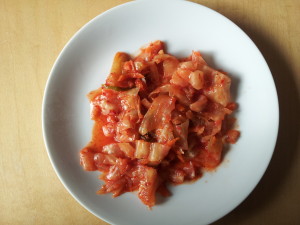 It has been known for a while that eating fermented foods and high fiber foods is healthy for us. A recent study confirms this view. Researchers at the Stanford Univ. of Medicine found that eating fermented foods actually reduces inflammation and increases the diversity of gut microbes (gut microbiome).
It has been known for a while that eating fermented foods and high fiber foods is healthy for us. A recent study confirms this view. Researchers at the Stanford Univ. of Medicine found that eating fermented foods actually reduces inflammation and increases the diversity of gut microbes (gut microbiome).
Researchers randomly assigned volunteers to one of 2 groups for 10 weeks: the fermentation foods group, and the high fiber group. Surprisingly, the group eating the high fiber diet for 10 weeks did not have changes in microbial diversity or changes in the 19 inflammatory markers studied. Instead, the researchers reported that the high-fiber diet "changes microbiome function and elicits personalized immune responses".
The fermented foods group ate a diet rich in yogurt, kefir, fermented cottage cheese, kimchi and other fermented vegetables (e.g. sauerkraut, traditional dill pickles), vegetable brine drinks, and kombucha tea. Each day they ate 6 servings (1/2 cup = 1 serving generally). The high fiber diet was rich in legumes, seeds, whole grains, nuts, vegetables, and fruits (increased their fiber intake from about 22 grams per day to 45 grams).
The fermented foods group ate six servings daily (e.g. 1/2 cup yogurt, kefir, fermented cottage cheese, kimchi, sauerkraut, traditional dill pickles, and kombucha tea). The high fiber group increased their fiber intake from about 22 grams per day to 45 grams, by eating a diet rich in legumes, seeds, whole grains, nuts, vegetables, and fruits.
High-fiber diets are associated with numerous health benefits such as lower rates of numerous chronic diseases and mortality. The consumption of fermented foods can help with weight maintenance and may decrease the risk of diabetes, cancer, and cardiovascular disease.
From Futurity: Fermented Food Diet Boosts Microbiome and Cuts Inflammation
In a clinical trial, 36 healthy adults were randomly assigned to a 10-week diet that included either fermented or high-fiber foods. The two diets resulted in different effects on the gut microbiome and the immune system.
Eating foods such as yogurt, kefir, fermented cottage cheese, kimchi and other fermented vegetables, vegetable brine drinks, and kombucha tea led to an increase in overall microbial diversity, with stronger effects from larger servings.
“This is a stunning finding,” says Justin Sonnenburg, an associate professor of microbiology and immunology at the Stanford University School of Medicine. “It provides one of the first examples of how a simple change in diet can reproducibly remodel the microbiota across a cohort of healthy adults.”
In addition, four types of immune cells showed less activation in the fermented-food group. The levels of 19 inflammatory proteins measured in blood samples also decreased. One of these proteins, interleukin 6, has been linked to conditions such as rheumatoid arthritis, Type 2 diabetes, and chronic stress.
“Microbiota-targeted diets can change immune status, providing a promising avenue for decreasing inflammation in healthy adults,” says Christopher Gardner, professor and director of nutrition studies at the Stanford Prevention Research Center. “This finding was consistent across all participants in the study who were assigned to the higher fermented food group.”
By contrast, none of these 19 inflammatory proteins decreased in participants assigned to a high-fiber diet rich in legumes, seeds, whole grains, nuts, vegetables, and fruits. On average, the diversity of their gut microbes also remained stable.
“We expected high fiber to have a more universally beneficial effect and increase microbiota diversity,” says Erica Sonnenburg, a senior research scientist in basic life sciences, microbiology, and immunology. “The data suggest that increased fiber intake alone over a short time period is insufficient to increase microbiota diversity.”
A wide body of evidence has demonstrated that diet shapes the gut microbiome, which can affect the immune system and overall health. According to Gardner, low microbiome diversity has been linked to obesity and diabetes.
The researchers focused on fiber and fermented foods due to previous reports of their potential health benefits. ... The researchers analyzed blood and stool samples collected during a three-week pre-trial period, the 10 weeks of the diet, and a four-week period after the diet when the participants ate as they chose.
The findings paint a nuanced picture of the influence of diet on gut microbes and immune status. On one hand, those who increased their consumption of fermented foods showed similar effects on their microbiome diversity and inflammatory markers, consistent with prior research showing that short-term changes in diet can rapidly alter the gut microbiome. On the other hand, the limited change in the microbiome within the high-fiber group dovetails with the researchers’ previous reports of a general resilience of the human microbiome over short time periods.
The results also show that greater fiber intake led to more carbohydrates in stool samples, pointing to incomplete fiber degradation by gut microbes. These findings are consistent with other research suggesting that the microbiome of people living in the industrialized world is depleted of fiber-degrading microbes.
